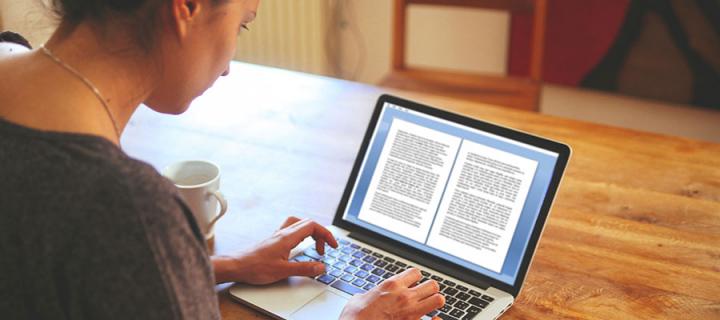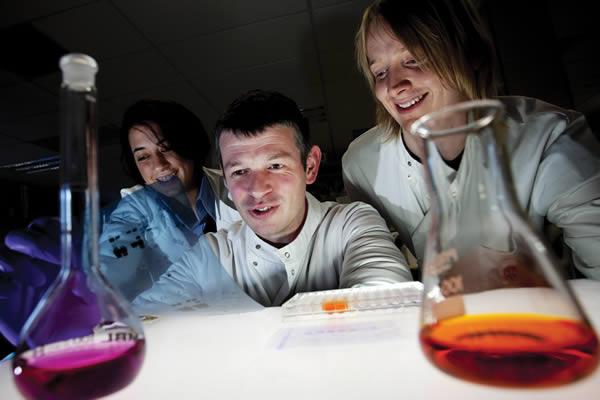Six Things I wish I knew before starting a PhD
Our PhD students share six things they wish they’d known before they started their PhD, from taking advantage of every opportunity to knowing when to take a break.
In this blog post, we have put together six bits of advice that will help you make the most out of your experience, whether you are considering applying for a PhD, are about to start one or recently began your journey.
1. You won’t get these opportunities again… so put yourself out there
Make use of all the resources that the university offers you. Whether that be going to a conference or participating in the social events that have been organised within your building - take it, because you won't get that opportunity again.
“Your PhD isn't just about doing experiments, getting results and being in the lab. It's also about building on your own skills, personal development and opening up doorways for your future. So whenever you see an event or a challenge or a talk, something that looks interesting - make the most of it, grab onto it and it will help you develop in so many ways.”
Phoebe, PhD Tissue Repair
2. You will wish you had taken better notes

Always write your protocols as you go along, gather your results up nicely, make sure you're on top of it from the beginning and you'll make life a lot easier for yourself when it comes to writing up!
“Write down EVERYTHING. This refers to your daily notes such as lab book notes. At the time you’re going to think such minor details are not necessary or you will remember these things anyway, but when the perfect antibody you are using stops working all of a sudden, you’re going to need all the lot numbers. Writing down exactly what things didn’t work is often more important than what did as this can be very helpful in troubleshooting.”
Priya, PhD Edinburgh Cancer Research Centre
3. Really get to know your supervisor
Try to have a good open relationship with your supervisor, because they are who can really help you when times are tough, and they'll help you make the most of your PhD.
“Build a strong relationship with them and tell them who you are. Make sure you get to know them well. Because your supervisors will not only advise you during your PhD time at the university but they will also guide you for the future - for your next step, in your jobs. So make sure you use those resources well.”
Phoebe, PhD Tissue Repair
4. You don’t need to be working 24/7

“You need to have other interests, hobbies and pursuits other than your PhD project. If a table has only one leg to stand on, it’s easy to get all wobbly once that leg becomes damaged.”
Theoklitos Amvrosiadis, PhD Precision Medicine
It is common for PhD students to feel guilty for not being sat at the desk the whole day but taking breaks is crucial to stay productive and motivated. Although it is important to work hard, it is just as important to go out and enjoy your time with others. Make sure you don’t isolate yourself and keep a strong support network of people around you that will keep you going through the adversities you will find along the way.
“Because as international students, when we don't have anybody to go back home to it can be so easy to keep working for long hours in your office or in the library for instance. So make sure you have decent work hours in the day. Make sure you take breaks, make sure you go out and enjoy the beautiful city. So yes work hard within the lab but also try and get out of the lab. Make sure you get that social interaction with your friends.”
Genevie, PhD Population Health Sciences
5. Sometimes things won’t go to plan… Learn to accept failure
"At the beginning of my second year, I experienced the worst imposter syndrome I had ever felt. I was tasked with setting up a pretty complex experiment and didn’t really know where to start. After many failed attempts I started panicking. “Maybe I just can’t do it” I thought as I pictured myself being kicked off my program.
A few weeks later, however, it was done. I learned a lot from that experience, mostly about 2-photon calcium imaging, but also about myself. I was the right person for the job not because of my expertise in imaging (which was non-existent!) but because I can be resourceful and creative.
But in reality, no matter how confident and skilled I am, sometimes experiments fail. Be it a mistake, an accident or a simple stroke of bad luck, it happens. And the only way to overcome a fear of failure is through exposure therapy. After a couple of rather spectacular failures, I have realized that there’s always a valuable lesson to learn from them. I won’t by any means say that I enjoy failing, but I can definitely say that for me, it is no longer the stuff of nightmares."

Michelle, PhD Integrative Physiology
“It is easy for us – PhD students – to become attached to the outcome of our latest experiment, the submission of a manuscript or a funding proposal, or our academic career in general. We often forget that the outcome is something we cannot directly control.
There has to be a shift in focus from the goal (the paper, the grant), which relies on many factors outside of our influence, to the process (conducting experiments properly, reading and understanding the literature…) which is the only factors we can actually control.”
Theoklitos Amvrosiadis, PhD Precision Medicine
6. You will get there!
“Realise that no matter what happens, you will be ok. Didn’t get into your desired PhD programme? There are countless others, you will be accepted somewhere (speaking from personal experience). Did you fail your PhD? Life certainly does not end outside of academia and your personal worth is not tied to two letters before your name.”
Theoklitos Amvrosiadis, PhD Precision Medicine
All PhD students will experience many obstacles and crises in their journey, and this is okay. Stay motivated by accepting that whatever happens, it won’t be the end of the world. Struggling is normal and expected and you will finish your degree!
"When everything seems to go downhill, don’t lose hope. I just started to work on my project and it gets desperate at times. If you are feeling overwhelmed like I was (am), don’t let it out on your project, you’ll get there. You’ll fix it. You’ll get your results. You’ll have a thesis. Just give it time! And in the meantime, embrace the opportunity that you have in your hands. How many people could say that they were brave enough to do the same thing as you’re doing?"
Madalena, PhD Evolutionary Biology
Related Links
How To Get A PhD - Ten Tips for Success
Top 10 Study Tips for PhD and Masters Students
Stress Awareness - Top Tips from our students


